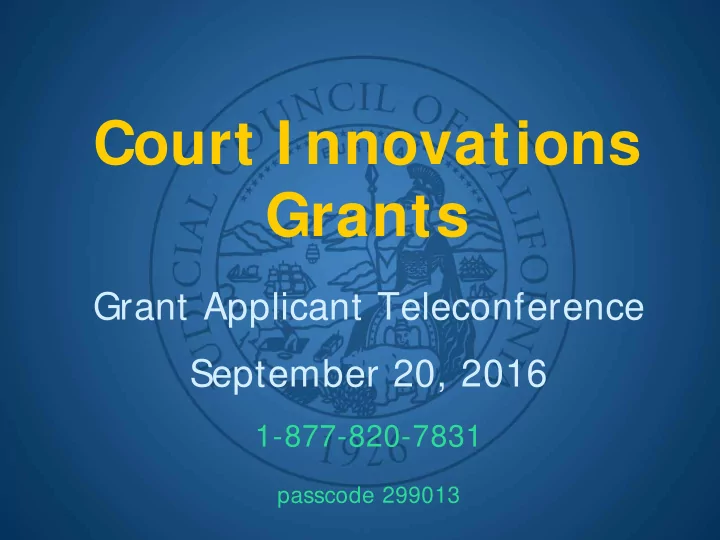

Court I nnovations Grants Grant Applicant Teleconference September 20, 2016 1-877-820-7831 passcode 299013
Welcome Court Innovations Grants Program Teleconference courts.ca.gov/InnovationsGrants.htm
Special Projects Staff • Jody Patel, Chief of Staff • Maureen Dumas, Principal Manager • Christa Jennings, Senior Analyst • Wesley Opp, Senior Analyst • Sherry Celio, Senior Analyst
Agenda • Grant Background and Overview • Timeline for Submissions, Review, and Award • Questions and Answers
Background The Budget Act of 2016, provided $25 million dollars in one-time funding to promote innovative and efficient access to justice.
Budget Act of 2016 Requires • Funds be used for trial and appellate court programs and practices. • Funds shall be used to promote innovation, modernization, and efficiency.
Budget Act of 2016 Requires • A competitive grant program to award funding to be developed and administered by the Judicial Council. • A quarterly report from the courts to the Judicial Council. • An annual report to the Legislature from the Judicial Council.
Budget Act of 2016 Requires • Courts provide information on: • how the funds will be used. • how the program or practice will be sustainable after the grant award period. • how the program or practice can be adopted and replicated by other courts.
RFA Overview • $25 million dollars available • Up to $12,000,000 for Collaborative courts • Up to $8,000,000 for Self-Help, Family, and Juvenile courts • Up to $5,000,000 for Other Efficiencies across all court types
RFA Overview • Courts may apply for more than one category • A separate application is required for each separate program proposal. • Exception for program applications that are exactly the same
RFA Overview • All trial and appellate courts are eligible. • Courts may apply: • Individually • Collaboratively with lead court • In conjunction with justice partner/government agency
RFA Overview • Proposals may be for the: • Development of a new program or practice. • Adoption of an existing program or practice from another court.
RFA Overview • Proposals may be for the: • Enhancement, expansion, and/ or improvement of an existing program or practice only if the proposal provides demonstrable results above the existing program or practice.
RFA Overview • Will seek to adequately fund as many projects as possible. • Distributed through competitive process • Distributed based on number and type of applications
RFA Overview • May consider awarding partial grants. • Prior to awarding a partial grant, the Judicial Council will consult with the recipient court.
Proposal Package Consists of four parts • Application Cover Page/Court Contact Information • Project Abstract • Project Narrative • Cost Proposal
Evaluation Criteria Proposals will be evaluated based on a 300 point scale Project Attributes (maximum 200 points) • Program Need 50 points Benefits 50 points Accessibility Innovation Modernization (combined) 100 points Efficiency Replicability Sustainability
Evaluation Criteria Project Management (maximum 100 points) • Project and Implementation Plan 15 points Program Management Capability 15 points Program Evaluation and Outcomes 20 points Cost Proposal 50 points
Expenditures • Eligible • Salary and benefits • Equipment (computers, office equipment) • Instructional material and supplies • Office Supplies • Travel • Training • Consultants/contractors
Expenditures (cont’d) • Ineligible • Supplanting existing funding • Routine replacement of office equipment, furnishings, or technology. • Any technology maintenance costs that extend beyond the end of the grant award period. • Facilities
Evaluation Process • Judicial Branch Budget Committee will evaluate • Staff may reach out to applicants for clarification or questions • Potential for JBBC to request a conference call with applicants.
Time Period for Award • Programs will run for the period for which they have applied: • Any time during the grant period of June 1, 2017 – June 30, 2020. • By Fiscal Year or portion thereof.
Grant Disbursements • Initial disbursement – upon notification that work has commenced. • Annual disbursement at beginning of Fiscal Year(s). • Based on Budget Detail Worksheets • Subsequent disbursements
Reporting and Tracking • Appellate courts - track grant expenses on a specific Project Cost Code (PCC). • Trial courts - track grant expenses with Work Breakdown Structure (WBS) codes in Phoenix Financial.
Reporting and Tracking, cont’d Quarterly Progress Reports • • Progress toward goals and objectives. • Program achievements and challenges • Collaboration with justice system and other local partners. • Changes to key staff or procedures. • Measurable outcomes as identified by the court in the program proposal.
Reporting and Tracking, cont’d • Judicial Council will provide data collection tools, reporting templates, and instructions. • Judicial Council will provide data collection technical assistance.
Reporting and Tracking, cont’d Quarterly Request to Revise Budget • Detail Worksheet • Document moved funds. • Desires to move funds from one budget line to another in the future. • Desires to move funds from one annual period to another.
Reporting and Tracking, cont’d • Fiscal tracking. • Final report. • 60 days after grant completion • Supporting documentation.
Key Events Applicant Teleconferences September 20, 2016 Grant Application Due October 31, 2016 Judicial Branch Budget Committee Review November 2016– March 2017 Presentation to Judicial Council April 2017 Notice of Intent to Award April 28, 2017 Intra-Branch Agreement Start Date June 1, 2017 Intra-Branch Agreement End Date June 30, 2020
Questions and Answers
Thank you for your participation in the Innovations Grants Teleconference innovationsgrants@jud.ca.gov
Recommend
More recommend